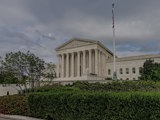Supreme Court Revises the Undue Hardship Test for Religious Accommodations

Supreme Court Revises the Undue Hardship Test for Religious Accommodations
For years, the EEOC has applied a de minimis standard for employers to apply when deciding whether or not they should grant an employee’s religious accommodation. This standard essentially allowed employers to deny such an accommodation if it would pose more than a minor burden on the business. In the Groff v. DeJoy opinion released on June 29, the Court stated that a higher level of hardship would be required to deny a religious accommodation. In particular, the Court noted that the employer in this case must show “substantial increased costs” when taking into account the nature, size, and operating cost of the employer. Although we must wait on the practical interpretation of this new standard from the lower courts, it appears that the undue hardship employers will need to show when denying a particular religious accommodation now falls closer to the high standard currently required under the Americans with Disabilities Act (ADA) and no longer allows a simple showing of a de minimis burden on the employer. To read more about the details and potential impact of Groff, click here for insight from Baker Donelson.


Posted:
Adams Keegan